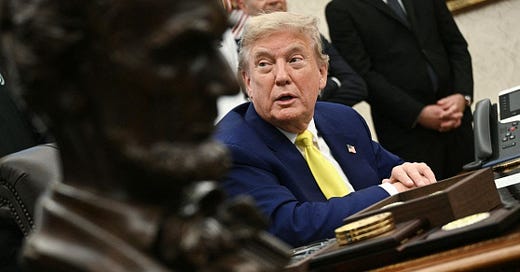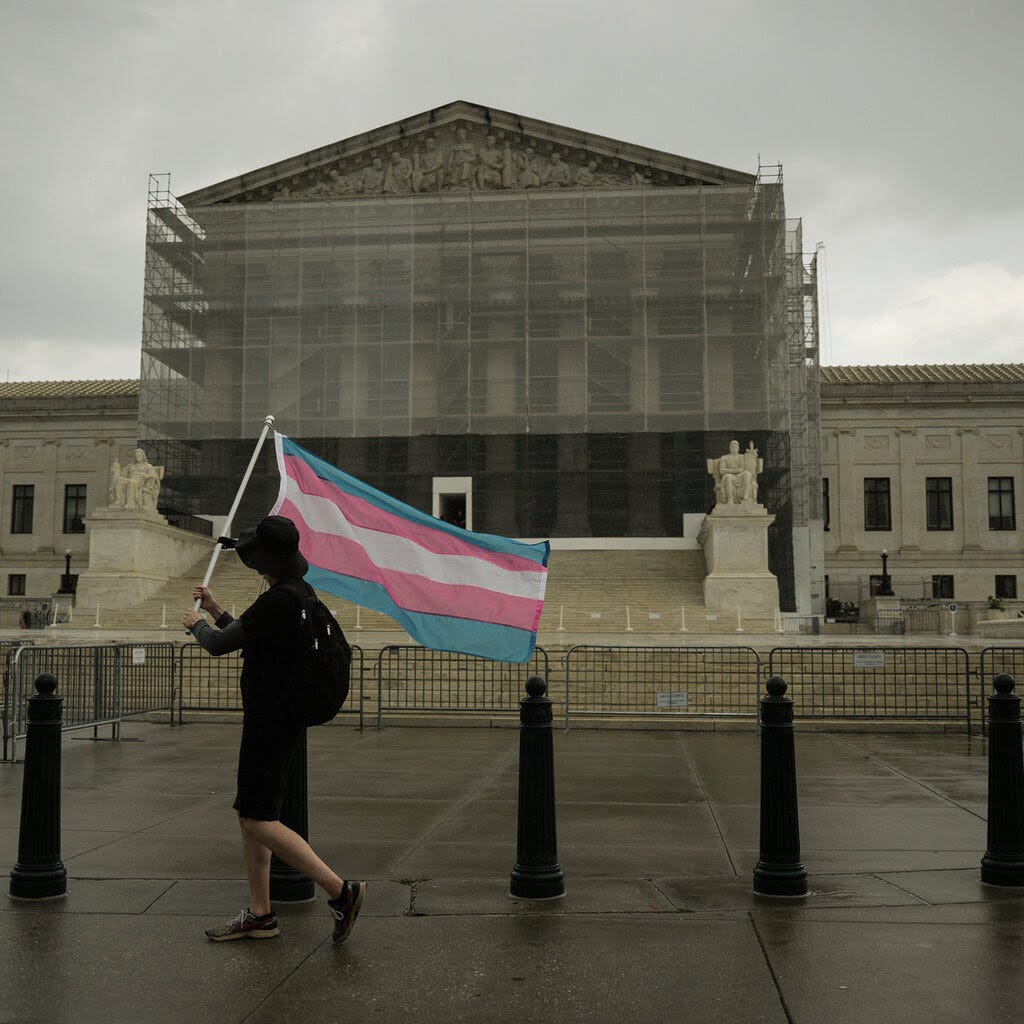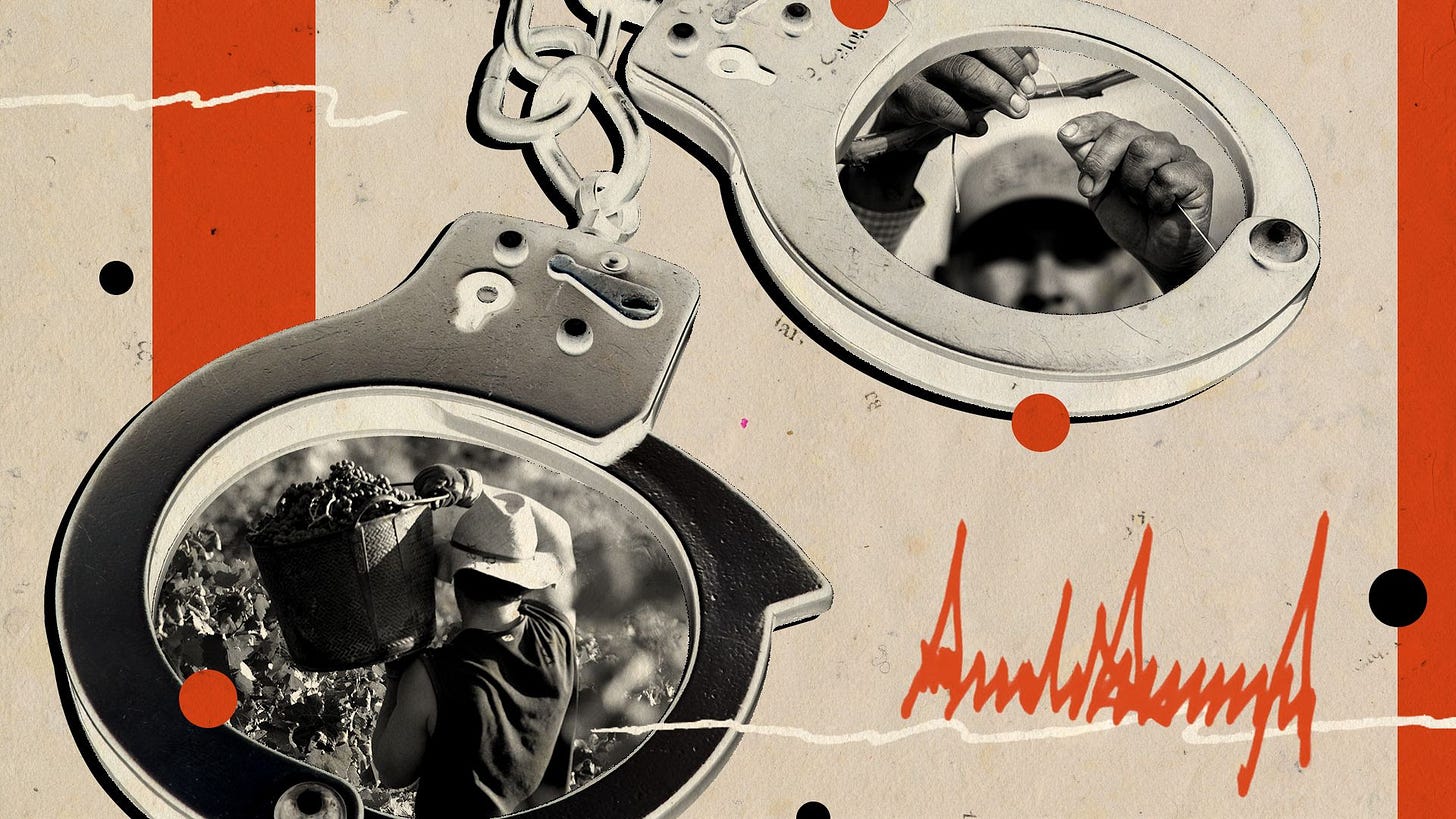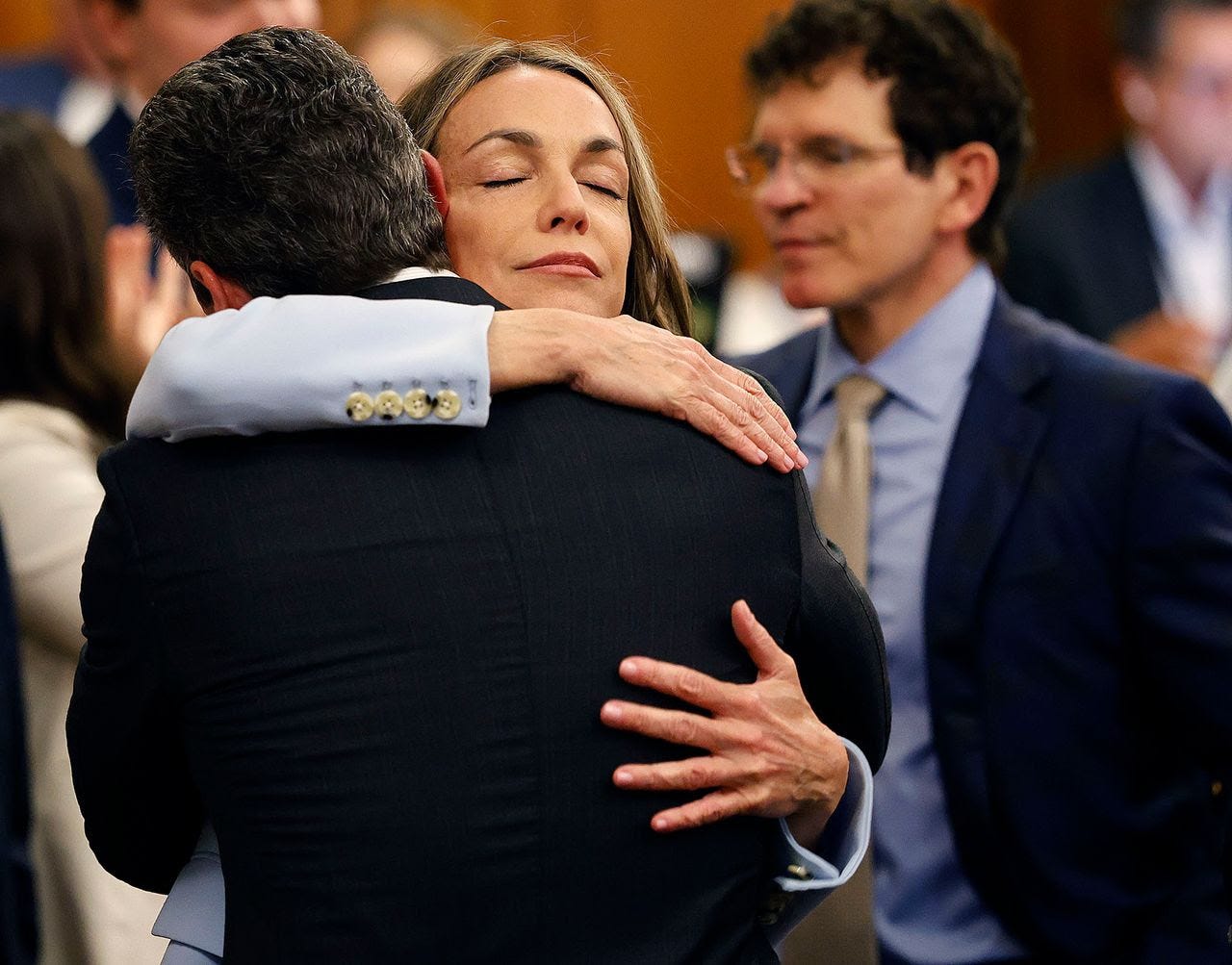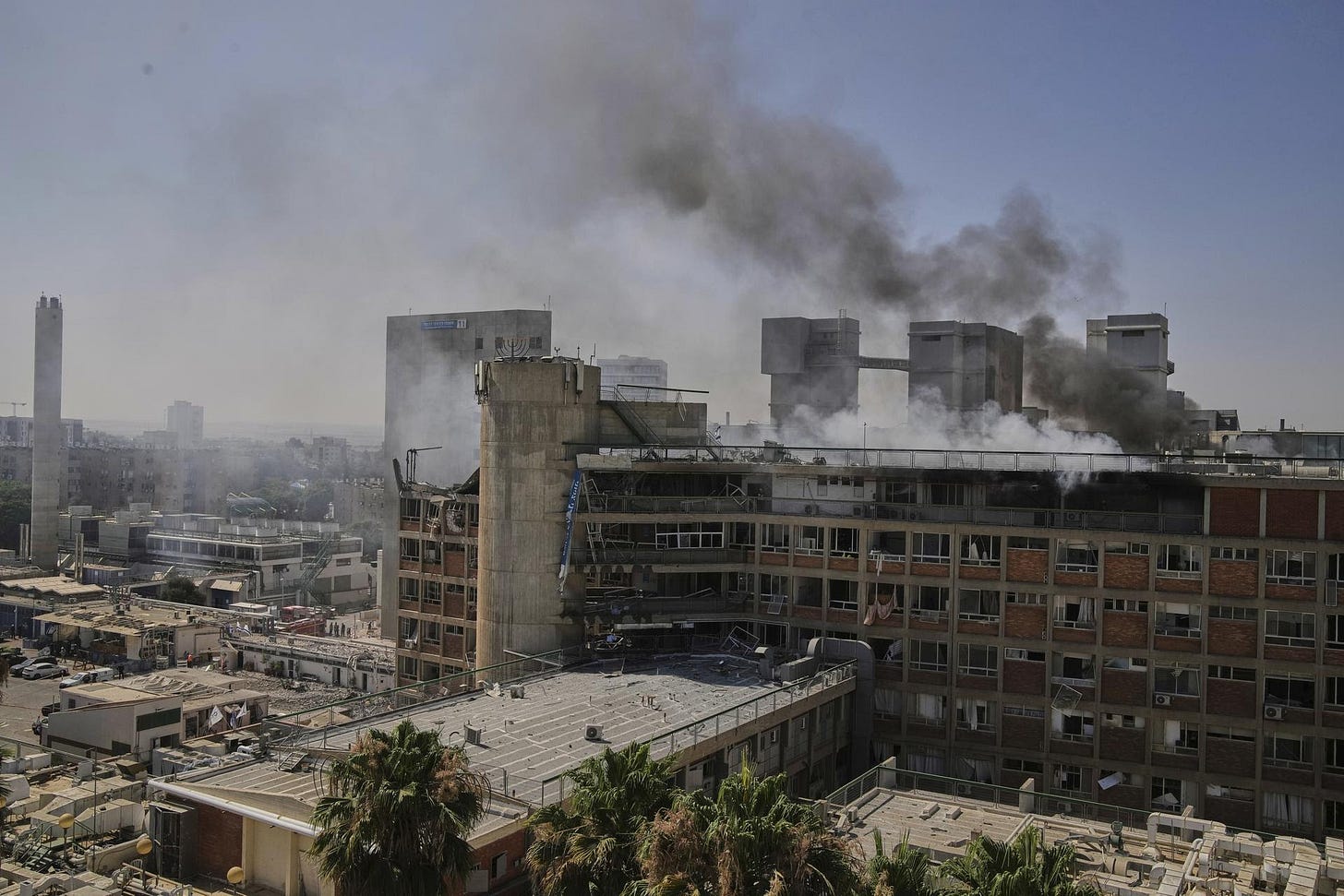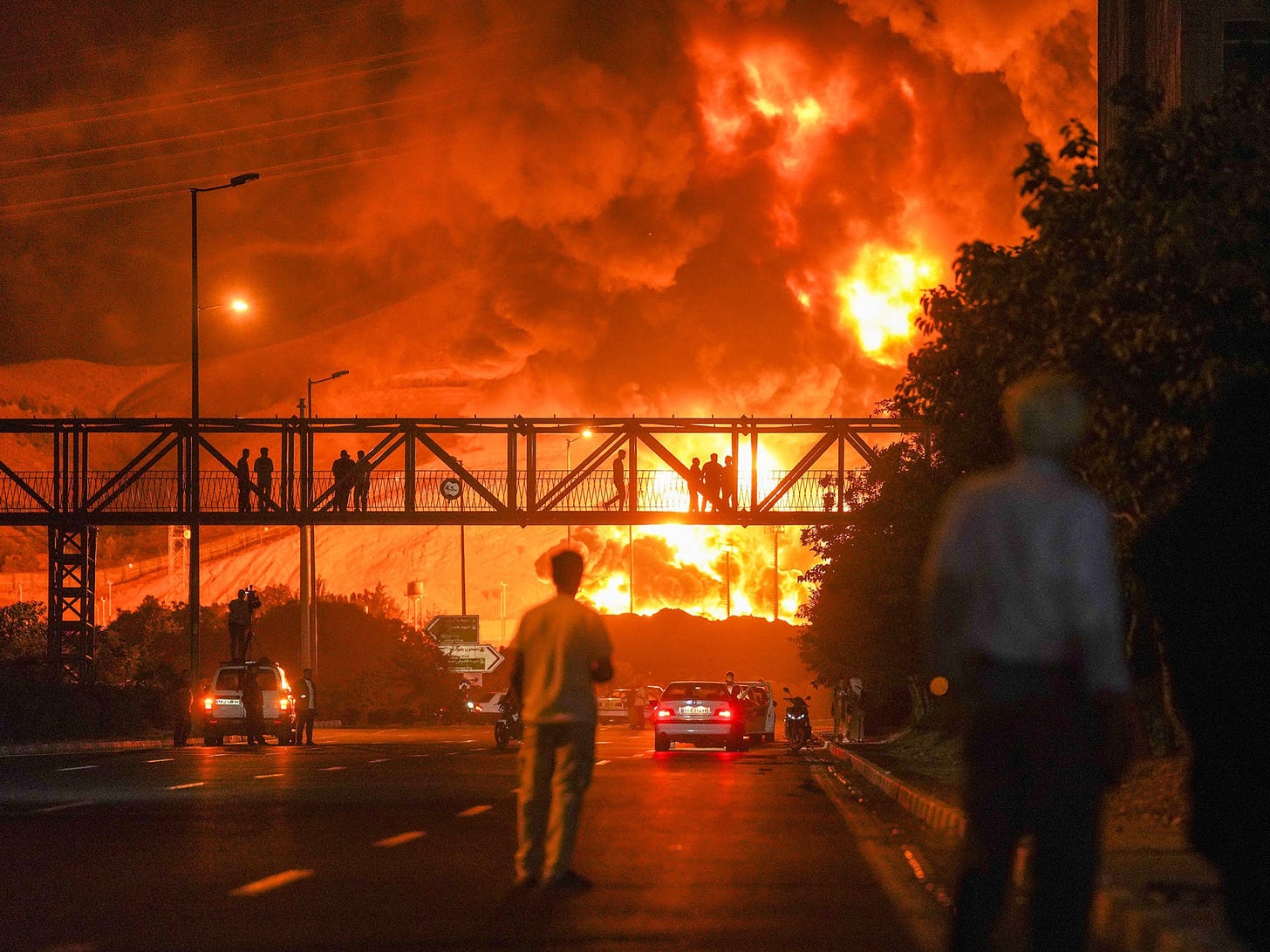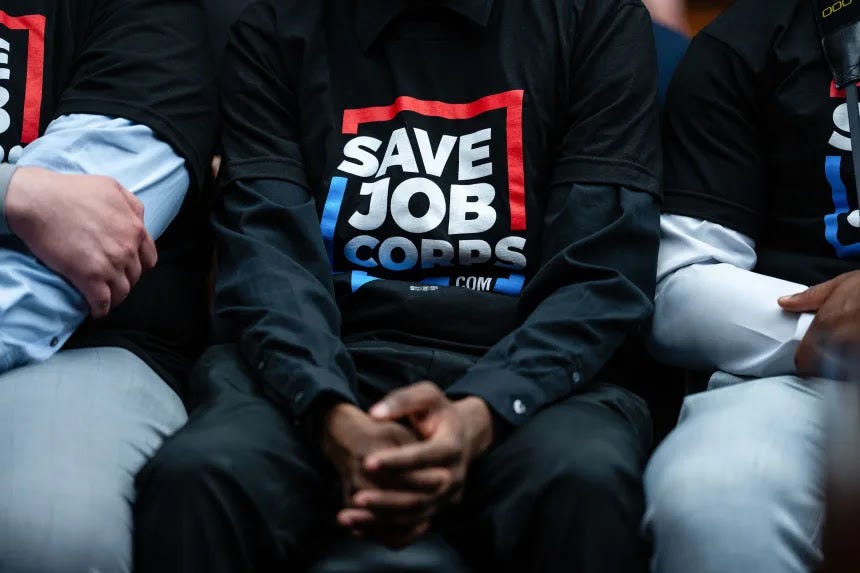“It's Juneteenth, the federal holiday marking Black emancipation from enslavement. Union Maj. Gen. Gordon Granger arrived in Galveston, Texas, on June 19, 1865, with news that the Emancipation Proclamation had been signed by President Lincoln more than two years earlier.” [Axios]
President Donald Trump delivered an “ultimate ultimatum” to Iranian leaders.
“The details: He told them to dismantle their nuclear program as he considers a plan to attack Iran. We asked 1,000 Americans if they support U.S. strikes — here’s what they said.
The latest: A hospital in southern Israel was struck by Iran — follow live updates here. See what sites Iran and Israel have hit in their escalating direct conflict with these maps.”
Read this story at Washington Post
Trump's big strike question
President Trump speaks to reporters in the Oval Office yesterday during a visit by Juventus, an Italian soccer team. Photo: Brendan Smialowski/AFP via Getty Images
“A key question that's on President Trump's mind these days, according to his advisers: If the U.S. joins Israel's war and drops its massive bunker busters, will they actually destroy Iran's most heavily fortified nuclear facility?
Why it matters: Trump's doubts yesterday about the certainty of success are one reason he was still questioning whether to move forward with a strike, Axios' Barak Ravid and Marc Caputo write.
Trump wants to make sure such an attack is really needed, wouldn't drag the U.S. into a prolonged war in the Middle East — and most of all, would actually achieve the objective of destroying Iran's nuclear program, U.S. officials say.
Zoom in: If Trump enters the war, it almost certainly would be to destroy the Fordow uranium enrichment site, which is built into a mountain south of Tehran.
It's at the top of Israel's target list. But Israel lacks the 30,000-pound bunker-buster bombs needed to destroy it from the air, along with the B-2 bomber aircraft to carry them. The U.S. has both within flying range of Iran.
Israeli officials fear that if Fordow survives the war, Iran's nuclear program will, too.
Behind the scenes: Trump has specifically asked his military advisers whether the Massive Ordnance Penetrator (MOP) would destroy Fordow, a U.S. official said.
Pentagon officials told Trump they're confident it would, according to the official. But it's not clear Trump was totally convinced.
MOPs have never been used on the battlefield, though they went through several tests during development, current and former U.S. officials say.
The other side: Israeli officials believe Trump will decide in favor of a U.S. strike, but contend they could cause significant damage to the Fordow facility even if forced to go it alone.
Prime Minister Benjamin Netanyahu and Ambassador to Washington Yechiel Leiter hinted in recent interviews that the Israel Defense Forces have options beyond just airstrikes.
One could be a risky commando raid. Israeli special forces conducted such an operation last September, albeit on a smaller scale, when they destroyed an underground missile factory in Syria by planting and detonating explosives.
Now that Israel has full control of Iran's air space and has dealt a heavy blow to Iran's military, that option appears less extreme than it otherwise would.
A U.S. official said the Israelis told the Trump administration that while they may not be able to reach deep enough into the mountain with bombs, they may ‘do it with humans.’” [Axios]
Axios Explains: The 30,000-pound bomb
Data: Royal United Services Institute. Graphic: Kavya Beheraj/Axios
“The 30,000-pound bomb might be the most important weapon for Israel's war with Iran — and it's in the U.S. military's hands, Axios' Jason Lalljee writes.
Why it matters: The U.S. alone possesses the world's most powerful non-nuclear bomb — and it's uniquely capable of targeting key Iranian facilities that Israel can't hit with its own weapons.
The bomb in question is the GBU-57 Massive Ordnance Penetrator, also known as the "MOP."
It's also known as the ‘bunker buster.’ And bunker-busting is exactly what Israel's aim is.
Iran's Fordow facility is built into a mountain and hundreds of feet underground — the kind of fortress the MOP is designed to penetrate.
Between the lines: Even the MOP would likely take two bombs hitting the exact same spot to destroy the facility, Robert Pape, a U.S. military historian, told the Financial Times.” [Axios]
Supreme Court upholds Tennessee’s ban on gender-affirming care for minors
“The Supreme Court has upheld a Tennessee law that bans gender-affirming medical care for transgender minors.
In a 6-3 ruling Wednesday, the court’s conservative majority concluded that the ban passed in 2023 does not discriminate against people based on their ‘transgender status.’ The justices also rejected arguments from the law’s opponents that it amounts to unconstitutional discrimination on the basis of sex.
‘The voices in these debates raise sincere concerns; the implications for all are profound. The Equal Protection Clause does not resolve these disagreements. Nor does it afford us license to decide them as we see best,’ Chief Justice John Roberts wrote in the majority opinion.”
Read the latest at POLITICO
By Ali Bianco and Eli Okun
The Supreme Court is seen on Monday, June 16, 2025, in Washington. (AP Photo/Mariam Zuhaib) | AP
“SCOTUS WATCH: The Supreme Court this morning dropped one of the most anticipated rulings of its term, upholding a Tennessee law to block gender-affirming care for transgender minors.
The details: The 6-3 decision, with all of the court’s conservatives in the majority, ruled that the law doesn’t violate the Equal Protection Clause and lowered the level of scrutiny courts should use to evaluate similar bans, POLITICO’s Josh Gerstein reports.
The context: It’s a massive blow to trans rights activists and marks the high court’s first major decision on an issue that has deeply polarized the country, CNN’s Devan Cole and John Fritze write. Plenty of other Republican-led states have enacted their own laws on treating trans minors. Today’s ruling means that judges considering similar challenges ‘will do so under the lowest standard of judicial review, meaning those other laws are more likely to be upheld by courts.’
Majority opinion: ‘This case carries with it the weight of fierce scientific and policy debates about the safety, efficacy, and propriety of medical treatments in an evolving field,’ Chief Justice John Roberts wrote in the majority opinion. ‘The voices in these debates raise sincere concerns; the implications for all are profound. The Equal Protection Clause does not resolve these disagreements. Nor does it afford us license to decide them as we see best.’ Read the full 118-page decision
A scathing dissent: Justice Sonia Sotomayor, joined by Justices Ketanji Brown Jackson and Elena Kagan, said the law ‘clearly draws sex-based distinctions and that Tennessee should have been required to prove in court the measure was necessary to advance an important state interest,’ Josh writes. ‘By retreating from meaningful judicial review exactly where it matters most, the Court abandons transgender children and their families to political whims,’ Sotomayor said in her dissent, which she read from the bench, a rare step generally deployed to express profound disagreement.
Three-box day: The Supreme Court ruled on a handful of other cases today. In a 6-3 ruling on NRC v. Texas, the court said plans to temporarily house nuclear waste in rural Texas and New Mexico could move forward, AP’s Mark Sherman reports. It reversed a federal appeals court ruling that invalidated the Nuclear Regulatory Commission’s license to private companies to operate their facilities in the area.
An interesting split: The court also ‘reached opposite conclusions in two cases considering where industry groups and states can sue the EPA over actions that have local and national effects,’ Bloomberg’s Kimberly Strawbridge Robinson reports. In a 7-2 ruling, the court said exceptions from renewable fuel standards should be petitioned in the D.C. Circuit for the U.S. Court of Appeals. But the justices also said in a unanimous opinion that challenges against state plans on air pollution should go to the regional court of appeals.
Still to come: After releasing five today, there are 16 decisions left to announce before the term wraps up in the coming weeks. And we’re still missing big cases, including the Trump administration’s blockbuster bid to end birthright citizenship and the related question of nationwide injunctions.
Another big EPA ruling: A federal judge ruled that the EPA had broken the law in refusing to spend $600 million in environmental justice grants from the Biden administration, POLITICO’s Alex Guillén reports.” [POLITICO]
June 19, 2025
Outside the Supreme Court. Tierney L. Cross/The New York Times
A losing bet
“I’m the editor of The Morning.
For years, the L.G.B.T.Q. movement racked up a slate of legal victories around marriage, military service and employment rights. But a political backlash has been brewing, and yesterday brought a profound setback: The Supreme Court ruled that states can bar doctors from providing puberty blockers and cross-sex hormones to minors who identify as transgender.
It wasn’t inevitable. The Supreme Court case turned on a particular argument: The plaintiffs, including three young Tennesseeans, said that when the state stopped them from taking these medications, it violated their constitutional rights. But the case was a legal and political gamble. It was rooted in uncertain science and contested ideas about sex and gender that most voters didn’t grasp or support, Nicholas Confessore reports today in The Times Magazine.
The Biden administration, the A.C.L.U. and L.G.B.T.Q. groups threw their weight behind the case, United States v. Skrmetti. It was ‘one of the biggest mistakes in the history of trans activism,’ Brianna Wu, a trans woman who serves on the board of Rebellion PAC, a Democratic political-action committee, told Nick. In today’s newsletter, I asked him to explain why.
This case is the legal culmination of a larger cultural movement. What is that?
Many L.G.B.T.Q. activists believe that gender identity should supplant older understandings of biological sex in the public sphere. In their view, one that emerged in recent decades from academia and left-wing political circles, people have the right to determine their own gender. And that determination should guide what appears on your driver’s license, what bathroom you use, what sports team you join. That goes for children, too.
When did that idea take hold?
Efforts to implement these concepts as federal policy took shape during the Obama administration. Next, in 2020, the Supreme Court ruled that employees could not be fired for being gay or transgender. Activists believed that gave them a firmer legal basis to seek expanded protections for gender identity. The Biden administration instructed federal agencies to interpret old civil rights laws against sex discrimination to include the newer concept of gender identity.
Then came the backlash. I remember an ad in the closing days of the 2024 presidential campaign that said Kamala Harris was “for they/them” and that Donald Trump was “for you.”
The ads spoke to a worry among some voters that trans activists were not simply asking for acceptance but demanding that other people reimagine their own identities. Once in office, Trump’s attacks went further: His policies express the view that being trans is a lie. Yet after the election, some polling showed that even most Democrats opposed allowing minors to get puberty blockers and cross-sex hormones.
That’s what yesterday’s ruling was about.
Right. Americans generally support protecting trans people from discrimination in areas like housing, the workplace and public spaces. But in Skrmetti, the court was asked to consider a more fraught question: Do minors have a constitutional right to treatments that halt and redirect their adolescence? A majority of the Supreme Court justices — six of the nine — said they don’t.
Protesting the decision. Tierney L. Cross/The New York Times
OK, but the justices aren’t supposed to concern themselves with public opinion. Why was this a risky legal argument?
The Supreme Court has never ruled that transgender status entitles people to heightened constitutional protection, the way, say, that race or nationality do. To many experts — and even some L.G.B.T.Q. activists — it was unlikely the court would do so in a case involving medical treatments for minors.
Why not?
A big reason is that the scientific debate behind gender-affirming treatments has become so heated. Relatively few American adolescents identify as transgender; even fewer seek medical care for gender dysphoria, the distress some people feel when their physical bodies do not align with their sense of gender. When judged against the strictest scientific standards, existing studies have not shown that gender-affirming treatments for adolescents reliably deliver the intended benefits, such as improved mental health. That’s why some countries, such as Britain, have restricted access to these treatments.
But many doctors still prescribe blockers and hormones.
Influential groups like the World Professional Association for Transgender Health, which issues guidelines on pediatric gender medicine, assert that low-certainty studies, combined with ‘clinical consensus’ — the real-world experience of doctors who have seen these treatments work — are a valid basis for prescribing them.
Will the Skrmetti case affect other trans rights?
Experts tell me it’s likely. If the court doesn’t believe that banning these treatments for minors violates the Constitution, it may hold that banning them for adults doesn’t, either. The court’s 2020 decision protecting trans and gay people from employment discrimination seems safe for now. But Skrmetti probably improves Trump’s chances of banning trans people from the military.” [New York Times]
1 big thing: Trump's gut-check
Photo illustration: Allie Carl/Axios. Photo: Brian van der Brug/Getty Images
“President Trump's hard-line approach sometimes softens, Jim VandeHei and Mike Allen write in a "Behind the Curtain" column.
Last week, he appeared to buckle — under pressure from farm interests, as conveyed to him by Agriculture Secretary Brooke Rollins — on his steadfast demand for the deportation of anyone who's in the U.S. illegally.
He took to Truth Social to say some workers here illegally, working on farms or hotels, are actually ‘very good, long time workers.’ Those are the same undocumented workers ICE is rounding up, often in front of cameras, to lock up and ship away.
But hard-ass Trump resurfaced this week, vowing to target those same ‘very good, long time workers’ across America's biggest cities, run by Democrats.
Why it matters: Trump, in private, is clearly wrestling with the political realities of long-time workers who paid taxes and committed no crimes (after coming here illegally) getting deported by the millions.
His economic advisers are warning him of hotels, restaurants, landscaping, construction and meatpacking companies going belly up.
Republican senators are warning about families getting torn apart and local businesses and services shuttering. Polls are showing broad support for locking up criminals and locking down borders — but much deeper division on going after people who played by U.S. rules after coming here illegally.
As Axios reported last month, the hardest of the hard-liners — White House deputy chief of staff Stephen Miller and Homeland Security Secretary Kristi Noem — want all undocumented immigrants expelled, regardless of economic and political consequences. That's the current position. But don't be surprised if the position softens, because Trump himself softens.
State of play: For now, the enforcement pendulum has swung back in favor of the very hard line of Miller and Noem — meaning raids at farms/hotels/restaurants.
Within the White House, Rollins' move that initially led Trump to back off raids on farms, hotels and restaurants angered some top aides, notably Miller, the architect of Trump's immigration and deportation policies.” [Axios]
Part 2: "Constant pressure" to ease off
President Trump watches workers install a new flagpole on the South Lawn yesterday. Photo: Ken Cedeno/UPI/Bloomberg via Getty Images
“Some GOP lawmakers and activists believe the debate over immigration enforcement is far from over, Jim and Mike write.
These sources note that Trump has already changed his mind twice, and that we haven't yet seen the true economic impact from waves of immigrant arrests.
Steve Bannon — the powerful MAGA podcaster, and top aide in Trump's first term — believes the president once again could be swayed to go easy on such economically crucial industries.
‘There's constant pressure. There are constantly people coming to him,’ Bannon said yesterday at a press breakfast hosted by the Christian Science Monitor. ‘He's someone that takes the business community's interests in mind,’ Bannon added, referencing Trump's career in hotels and construction.
Bannon also said that within the right-wing populist movement, Trump is actually a ‘moderate.’
Behind the scenes: Axios reporters are hearing about low morale within ICE. The agency is being stressed by the demands by Miller and Noem that agents arrest 3,000 immigrants a day nationwide — a quota that many within ICE don't believe is achievable.
Some agents are stressed by the tactics some of their colleagues are using in making arrests. Others are disheartened by the response that masked, heavily armed agents have received in several communities.
We've also heard that some ICE agents are afraid of being fired for not meeting arrest quotas — the agency still hasn't hit the 3,000-per-day goal.
What we're watching: Senate Agriculture Committee chair John Boozman (R-Ark.) told Axios he plans to meet with Agriculture Secretary Brooke Rollins again soon to discuss the worksite raids issue. In the meantime, he's been fielding complaints from farmers across the country.
‘A lot of their workforce have questionable papers, and so they're concerned,’ Boozman said. ‘When you get mixed signals, it breeds uncertainty. So it's hard for businesses to plan,’ he added, echoing the concerns many businesses have expressed about Trump's tariff policies.” [Axios]
Axios' Brittany Gibson, Stef W. Kight and Hans Nichols contributed reporting.
By Ankush Khardori
Federal agents patrol the halls of immigration court at the Jacob K. Javitz Federal Building today in New York City. | Michael M. Santiago/Getty Images
“SELECTIVE ENFORCEMENT — Donald Trump campaigned last year on the promise of an aggressive, wide-ranging crackdown on illegal immigration throughout the country and a mass deportation program that would expel record numbers of undocumented immigrants.
Now he understands the political cost of those promises.
Over the last week, Trump has been caught between different factions within his administration that appear to disagree on a politically fraught subject — whether to effectively exempt farms, hotels and restaurants from the administration’s supposed zero-tolerance enforcement agenda.
It’s a debate that is not likely to go away anytime soon — particularly given the administration’s insistence on keeping immigration enforcement at the forefront of its domestic agenda, as well as persistent questions since Trump’s inauguration concerning the administration’s selective enforcement of federal law.
The immigration debate spilled into public view last week after Trump posted a message claiming that farmers and businesses in the hospitality industry were complaining ‘that our very aggressive policy on immigration is taking very good, long time workers away from them, with those jobs being almost impossible to replace.’ ‘Changes are coming!’ he added.
The shift was reportedly a result of pushback from Republican allies and businesses in the nation’s agricultural regions, which rely in large part on immigrants — both documented and undocumented — to do their work. A full-scale crackdown that includes the agriculture and hospitality sectors threatens to disrupt many of those businesses and the local economies in which they operate.
Many Trump supporters and some key Republicans, however, balk at the notion of enforcement carve-outs. Republican-run states hammered the Biden administration on this issue, and now the question is whether the Trump administration will put the full force of its resources behind an enforcement push that could reach deep into red state territory. Trump seemed to equivocate in a follow-up post in which he said that he was directing ICE to expand its efforts in large cities run by Democrats but made no mention of workplace raids that might significantly affect red states.
The evident friction within the Republican party on this point could ultimately hamper Trump’s ability to meet his aggressive deportation targets. An enforcement strategy that effectively exempts large geographic and economic sectors of the country would also further a trend that has become a defining feature of Trump’s second term — his apparent lack of interest in the consistent application of federal law.
The examples have piled up since Trump’s first day back in office. The president, for instance, often rails against alleged assaults on law enforcement officials, but of course he pardoned hundreds of people accused (and in many cases convicted) of similar conduct on Jan. 6, 2021. Trump has also pardoned or commuted the prison sentences of dozens of political allies and donors who were convicted of serious criminal offenses. Meanwhile, Trump’s Treasury Department announced that it would not enforce a corporate transparency law, and his Justice Department has significantly curtailed enforcement of a foreign anti-bribery law.
The president’s political supporters have largely kept quiet about these developments, but it was not that long ago that some prominent Republicans insisted that the exercise of any sort of prosecutorial discretion — based on sound public policy objectives or otherwise — was inherently corrupt and unlawful.
‘Americans expect their prosecutors to prosecute crimes,”’Kevin Roberts, the president of the Heritage Foundation and a key architect of Project 2025, wrote in 2023. Roberts was railing against so-called progressive prosecutors working at the local level, but these days, he could arguably direct those words at Trump himself, who has refused to enforce not just some criminal laws but major civil prohibitions as well.
Earlier today, Trump announced that he would once again ‘extend’ his decision not to enforce a U.S. ban on TikTok. The ban was passed into law last year by large, bipartisan majorities in both houses of Congress and affirmed by a unanimous Supreme Court shortly before Trump took office, but Trump quickly announced that he would not enforce it.
All of Trump’s ad hoc, unilateral exemptions from federal law have had a consistent throughline: They benefit Trump and his political allies.
On his first day back in office, he pledged to deploy the full array of federal law enforcement tools at his disposal in support of a maximal enforcement agenda. In the context of immigration enforcement, however, Trump is quickly discovering that some of his biggest political allies may have different agendas.” [POLITICO]
The U.S. will require student visa applicants to make their social media public.
“Why? It’s part of a crackdown that could affect hundreds of thousands of people. If you’re worried about your phone being checked while traveling, here’s some advice.
In other news: Trump left soccer players speechless with questions about transgender issues yesterday. And an anti-Trump statue appeared on the National Mall — take a look.
One more thing: What do the young women of MAGA want? It’s complicated.”
Read this story at Washington Post
Social Security is running out of money much faster than expected.
“What to know: The trust funds for Social Security and Medicare will run out of money in less than a decade, a new report warned. If Congress doesn’t act, benefits could be slashed.
Some expert advice: Regardless of Social Security’s future, it’s a good idea to build your own savings safety net — here are three moves you can make.”
Read this story at Washington Post
Elected officials detained
“In recent months, at least five elected officials have been arrested or confronted by police for protesting President Trump’s sweeping deportation efforts. New York City comptroller and mayoral candidate Brad Lander was arrested at Manhattan’s immigration court on Tuesday. Sen. Alex Padilla, California's first Latino elected to the Senate, was forcefully removed from a news conference in Los Angeles last week and handcuffed on the ground after attempting to ask Homeland Security Secretary Kristi Noem a question. Newark Mayor Ras Baraka was arrested for attempting to join three members of New Jersey’s congressional delegation inside an immigration detention facility on May 9. Rep. LaMonica McIver was indicted last week on federal charges alleging she interfered with immigration officers outside the same detention center. And Milwaukee judge Hannah Dugan was arrested in April for allegedly helping a defendant evade immigration officials.” [CNN]
Suicide hotline
“The Trump administration plans to end the 988 Suicide & Crisis Lifeline’s specialized services for LGBTQ+ youth. According to the Department of Health and Human Services’ Substance Abuse and Mental Health Services Administration, anyone who reaches out to the 988 Lifeline will still receive help, but the ‘Press 3 option,’ which connected callers to crisis counselors trained to work with LGBTQ+ youth and adults under 25, will no longer be available. Since the specialized service launched in 2022, nearly 1.3 million callers have reached out for assistance. The change was announced on the same day the Supreme Court upheld Tennessee’s ban on gender-affirming care for transgender minors. Roughly half of US states have bans similar to Tennessee's. Transgender advocates framed the ruling as a ‘devastating loss.’” [CNN]
Karen Read was found not guilty of her police officer boyfriend’s murder.
Karen Read hugs lawyer Alan Jackson after a not-guilty verdict of second-degree murder. (Greg Derr/Patriot Ledger/AP)
“The case: Prosecutors alleged Read hit her boyfriend, John O’Keefe, with her car after an argument. Her lawyers argued she was framed in a law enforcement cover-up.
The verdict: A Massachusetts jury acquitted Read yesterday, a year after a judge declared a mistrial on identical charges. The case became a tabloid and true-crime fixture.”
Read this story at Washington Post
The first big heat wave of the summer hits tomorrow.
The highest temperatures from today to Wednesday. (Ben Noll/The Washington Post)
“Where? Record-breaking temperatures and humidity will begin in central states and move eastward, affecting around 225 million people — find the forecast and more maps here.
What’s causing it? A heat dome. That’s a heat-trapping lid of strong high pressure in the atmosphere. This one could keep things sweltering for more than a week.”
Read this story at Washington Post
INTERNATIONAL
Smoke rises from a building of the Soroka hospital complex after it was hit by a missile fired from Iran in Be'er Sheva, Israel, Thursday. (AP Photo/Leo Correa)
Israel threatens Iran’s top leader after missiles damage hospital and wound dozens
“Israel’s defense minister overtly threatened Iran’s supreme leader on Thursday after the latest missile barrage from Iran damaged a major hospital and hit a high-rise and several other residential buildings near Tel Aviv. At least 40 people were wounded in the attacks, according to Israel’s Magen David Adom rescue service. Israel, meanwhile, carried out strikes on Iran’s Arak heavy water reactor, in its latest attack on the country’s sprawling nuclear program. Read more.
What to know:
Israeli Prime Minister Benjamin Netanyahu condemned the attack and vowed a response, while Defense Minister Israel Katz blamed Iran's Supreme Leader Ayatollah Ali Khamenei and said the military ‘has been instructed and knows that in order to achieve all of its goals, this man absolutely should not continue to exist.’
Iranian state TV said there was ‘no radiation danger whatsoever’ from Israel’s attack on the Arak heavy water reactor site. An Iranian state television reporter, speaking live in the nearby town of Khondab, said the facility had been evacuated and there was no damage to civilian areas around the reactor..
Heavy water helps cool nuclear reactors, but it produces plutonium as a byproduct that can potentially be used in nuclear weapons. Israel, in conducting its strike, signaled it remained concerned the Arak facility could be used to produce plutonium again one day. Already, Israel’s campaign has targeted Iran’s enrichment site at Natanz, centrifuge workshops around Tehran, and a nuclear site in Isfahan.” [AP News]
“Five months into his second term, Donald Trump faces a potentially defining moment as he weighs whether to order a US attack on Iran over its nuclear program.
Top officials in Washington are preparing for a possible strike in coming days, while Trump told reporters he’ll make his ‘final decision one second before it’s due.’
The uncertainty adds to surging tensions across the Middle East almost a week since Israel began its assault on Iran. Israeli missiles hit a nuclear site in the Islamic Republic, which reported no radiation risk, and Iran struck the largest hospital in southern Israel today.
Oil-rich Gulf Nations were blindsided by Israel’s attack. Only a few weeks ago, they were hosting Trump, pledging billions in investments and flattering him with lavish receptions. They believed that gave them an inside track into the US president’s camp. In reality, they are mere bystanders trying to divine his next move — just like the rest of the world.
Meanwhile, markets are volatile as traders fret about potential disruptions to oil supplies.
Beijing and Moscow have condemned Israel’s attack, though neither has shown much interest in aiding Iran. Russia is fearful the regime in Tehran may follow its ousted Syrian ally Bashar Al-Assad.
WATCH: Paul Wallace, managing editor for Middle East government, discusses the possibility of a US strike on Iran on Bloomberg TV.
Trump’s readiness to countenance joining Israel in destroying Iran’s nuclear program is putting him at odds with his “America First” base of supporters who elected him on a commitment to avoid foreign military entanglements.
While Tehran is defying his demand for ‘unconditional surrender,’ Trump may be trying to create a window for last-minute diplomacy. Foreign ministers from the UK, France, and Germany plan nuclear talks with their Iranian counterpart in Geneva tomorrow.
The crisis is evolving fast — and prospects for a diplomatic breakthrough appear extremely low at best. Trump’s final-second decision may shape the Middle East and his presidency for years to come.” — Abeer Abu Omar [Bloomberg]
A plume of heavy smoke and fire rises from an Iranian oil refinery after it was hit in an Israeli strike on Sunday. Photographer: Ahmad Hatefi/UPI/Shutterstock
On the latest episode of Trumponomics, we discuss how Israel’s surprise attack on Iran isn’t yet having the expected impact on energy markets. Listen on Apple, Spotify, or wherever you get your podcasts.
“Thailand’s government faces collapse after a leaked phone call unleashed renewed political turmoil, with Prime Minister Paetongtarn Shinawatra facing pressure to resign and street protests as she grapples with the exit of the second-biggest party in her coalition. Bhumjaithai quit the government, citing a loss of trust after the premier appeared to criticize the Thai army’s role in a border dispute during the call with former Cambodian leader Hun Sen.” [Bloomberg]
Paetongtarn Shinawatra at a news conference in Bangkok today. Photographer: Valeria Mongelli/Bloomberg
“Bolivian President Luis Arce plans to use millions of dollars of overseas loans to tackle crippling fuel shortages and soaring consumer prices before he leaves office in November, he told us in an interview. The South American leader said he’s hopeful the measures will help stabilize an economy that’s grappling with its most serious crisis in decades, ahead of elections in August in which he is backing his party’s candidate, Eduardo del Castillo.” [Bloomberg]
“Former Argentine President Cristina Fernández de Kirchner started her first full day of house arrest for a corruption conviction wondering what exactly she is authorized to do at her Buenos Aires home for the next six years. ‘Can I go out to my balcony or not? It sounds like a joke, but no,’ she said in a post on X, attaching a letter from her lawyers to the court asking whether she can speak to her supporters gathered outside.” [Bloomberg]
Fernández on her balcony in Buenos Aires last week. Photographer: Luis Robayo/AFP/Getty Images
“Spain’s most-detailed account yet of the missteps leading to April’s nationwide blackout failed to fully explain why the power grid was so unstable in the first place. The government blamed the grid operator for failing to ensure enough backup generation and plant operators for not fulfilling commitments; it didn't explain what caused voltage surges that the system was unable to cope with, and what could be done, if anything, to prevent that in the future.” [Bloomberg]
“One of Colombia’s highest courts blocked President Gustavo Petro’s bid to hold a referendum on strengthening labor rights, denying him a potential boost at a time when the government’s popularity is waning.” [Bloomberg]
“Rwanda and Democratic Republic of Congo will sign a peace agreement next week, according to the US State Department, in a bid to end a decades-long conflict between the African neighbors.” [Bloomberg]
“New Zealand has paused development funding to the Cook Islands after the tiny South Pacific nation signed agreements with China without the level of consultation expected by the government in Wellington.” [Bloomberg]
“President Vladimir Putin revealed that his grandchild speaks fluent Chinese because her nanny is a Beijinger and said that Russians in general are showing greater interest in learning the language, highlighting deepening ties between the two nations.” [Bloomberg]
Trash stash
“Viral videos of garbage captured by explorers in China’s Zhangjiajie Forest — with one explorer describing waste piled seven to eight floors high — have prompted a mass cleanup. From 2010 to 2015, the local government banned trash burning, so dumping in caves became common.” [CNN]
BUSINESS AND ECONOMY
Fed leaves interest rates unchanged but warns about risks of inflation and slower growth
“Six months after the Federal Reserve hit pause on interest-rate cuts, the central bank remains firmly in wait-and-see mode as it gauges the fallout from President Donald Trump’s trade war and other policies.”
Read more at Washington Post
Iconic US Steel now 100% owned by Japan’s Nippon Steel, despite past Trump opposition
“Nippon Steel has finalized its deal to buy 100% of US Steel, the iconic steelmaker that was once the world’s most valuable company and a cornerstone of American industrial might.
The companies announced Wednesday that the two had completed the partnership. Under the terms of the deal first announced in December 2023, Nippon will buy US steel for $55 per share, or $14.1 billion. The company will also retain its name and Pittsburgh, Pennsylvania headquarters.”
Read more at CNN
Eric Lee/Bloomberg/Getty Images
At risk
“Job Corps centers provide housing and schooling for low-income students aged 16 to 24. The six-decade old program has provided a lifeline for more than two million young Americans, but its fate is now uncertain after the Trump administration ordered its operations to be paused.” [CNN]

